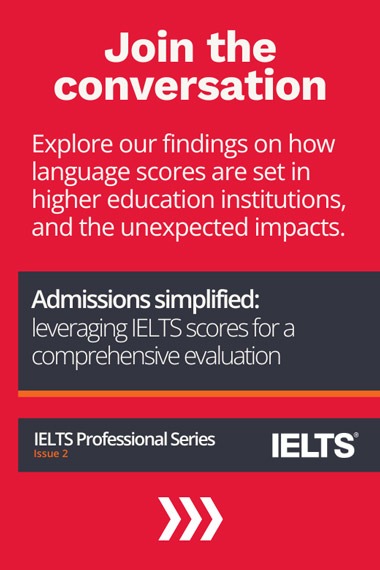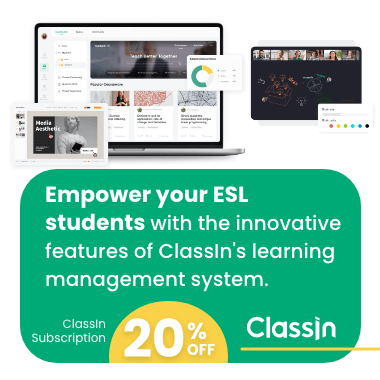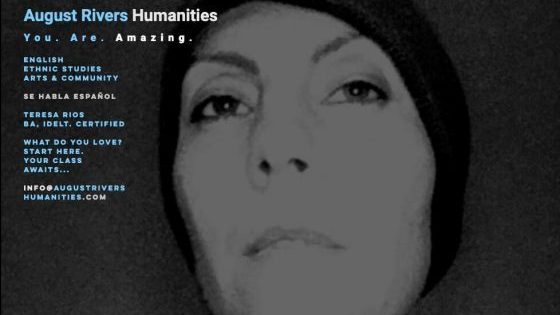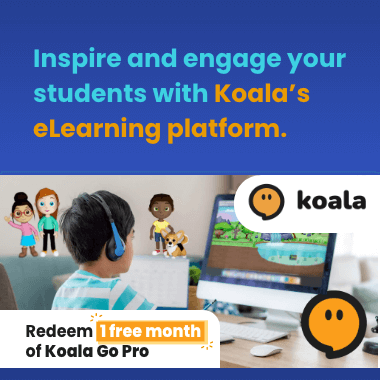Language and art therapy guru, Teresa Rios, is a Bridge IDELTOnline™ grad and the founder of August Rivers Humanities, a tutoring business that delivers ESL sessions as memory care for elders. Inspired by her upbringing and artistic family background and wanting to advocate for elders and those with memory loss, Teresa became a pioneer in ESL memory care. Read on to find out more about her educational philosophy and how she has used language as a therapy to help countless seniors and their families.
Can you tell us a bit about yourself and your background?
Background
I am an Ethnic Spanish American Romani living in the San Francisco Bay Area. I am caring for a parent with Primary Progressive Multiple Sclerosis and living with my own Relapsing-Remitting Multiple Sclerosis. I was born in Southern Spain to one of the country’s oldest and most notable flamenco dynasties, on my father’s side. On my mother’s side, I came from humanities teachers, artists and writers. No one could add two plus two, but the creativity flourished.
A diverse upbringing
I traveled in Europe and the U.S., studied at home a lot and had diverse experiences with wealth and poverty, racism and privilege, status quo and outsider status. Looking back, I realize that it served to inform an interdisciplinary and holistic approach to life. It also gave me a sense of my identity really early on. My mom is actually one of the best marketing consultants around, and I think I inherited her head for business, so it’s blooming lately into a field that intersects education, art, justice and healing.
Education
I hold a Bachelor of Individualized Studies in Interdisciplinary Arts with concentrations in Visual Art, Creative Writing and Ethnic Studies with minors in music. My background is in progressive education, which to me is all about approaching study with one’s passions, converting a challenge into motivation and reinvesting our successes into our community.
I believe in the interconnectedness of passion, education, profession and healing.
You’re a graduate of the Bridge IDELTOnline™ program. Why did you choose that certification course, and how did it help you in your career?
A change of plans
I fell ill towards the end of my studies. I was at first devastated that I would not be able to travel the world teaching English, supporting and documenting my interests and causes. Reflecting on the nature of transformative education, I realized that I needed to find my own way to do things anyway.
I took a year off and spent it using the research and exercising the critical thinking and analytical skills I had acquired to consider possible diagnoses as well as career options. I advocated for myself medically and decided to travel the world online on my own schedule. I wanted to help myself and others like me. I have been very fortunate that many people have helped me along the way. There were some rough times.
Using the IDELTOnline to form a new path
The Bridge IDELTOnline gave me a chance to experience quality education, participate in a global community of teachers and learners, earn the titles and learn the skills that I would need to launch an international career, working when I am most present and able-bodied, just as I did in school. I received an IDELT (International Diploma in English Language Teaching), which allows for a global client pool, a low overhead and free borders for an independent tutor or small American business working online. I can also work for online academies anywhere in the EU since I am a dual citizen.
I supplemented my IDELT with the specialized certifications in Teaching English Online, Curriculum Design/English for Specific Purposes, Teaching English to Young Learners, Teaching Business English and the one-year Grammar Advisor. We call mom “the grammar advisor” now because she looks exactly like the cartoon on the site!

Who was your tutor and how did she help you during the course?
My tutor was Terry McLean and she is wonderful. Terry is very astute socially and academically and puts her whole self into reviewing students’ work as well as facilitating communications in the community. She is detailed and thoughtful in her responses to work, offers amazing feedback and encouragement and just has a knack for seeing who her student is and helping to guide and respect their individual journey.
Terry gave me much encouragement and provided me with practical resources as well as room to explore my theories. I felt I had a chance to explore and experience and practice, but also that she prepared me and gave me tools. That is rare these days. I would describe her as very present, experienced, calm, informed and graceful. If you study with Terry, you’ll love her.
You currently have a tutoring business, August Rivers Humanities, that delivers ESL as memory care for seniors. Can you tell us more about that?
About August Rivers
August Rivers Humanities was named after my dad, musician Agustin Rios. In the beginning, I was looking to address a notion I was coming up against that associated interdisciplinarity with a lack of focus. I’ve always been interested in arts, languages, humanities, justice and health. It’s never really felt like five different things to me. I’ve often felt on the sidelines in life in terms of articulating myself culturally and linguistically and neurologically, and I’ve expressed myself with art and writing and in different languages and customs. I wanted one place that would house all of my projects and include my tutoring, so I started August Rivers.
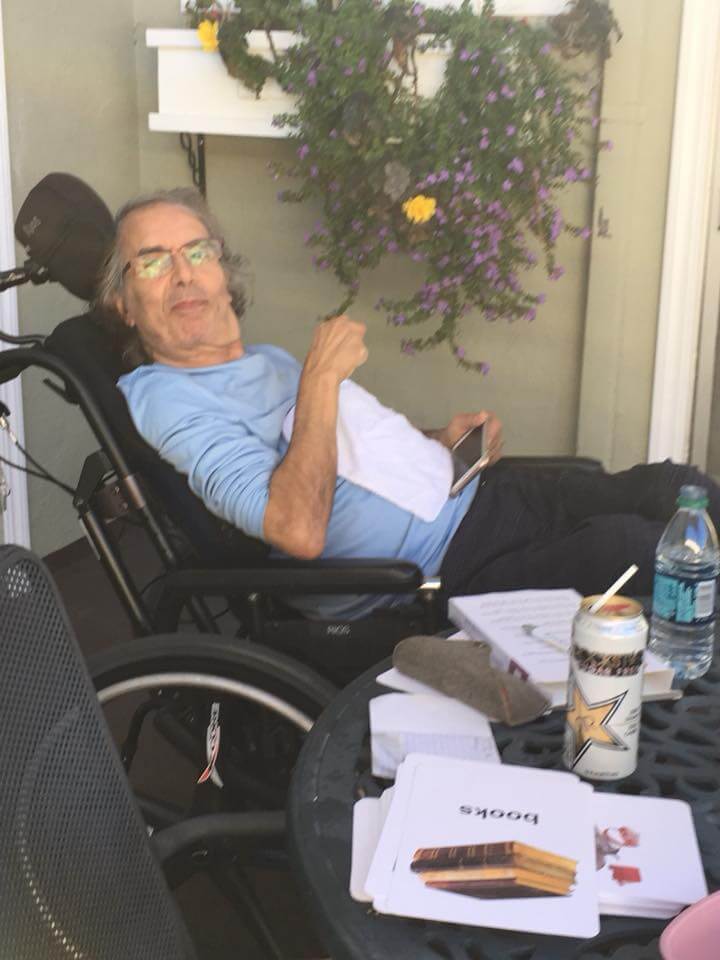
Teresa’s dad working with ESL conversation cards
ESL as memory care
I’m independent and work as an artist, tutor and advocate. I offer tutoring in various humanities subjects and specialize in bilingual, intergenerational and asynchronous learning. Therapeutic ESL as memory care is designed to address the needs of elders in America who are experiencing the loss of English as their second language due to dementia.
The goal is to provide or supplement memory care for an elder with activities delivered via ESL. A few things in our community are prevalent: dementia, neurological disease and a generation of elders whose first language differs from that of the next generation. This is exacerbated by the widespread unavailability of memory care, as well as of linguistic support for the majority of seniors.
There are a variety of situations that require a holistic approach, such as elders who are losing a second language that is their child’s first and only language. In this scenario, the attempt is to preserve not only the language but find creative solutions to preserving the child/parent relationship. Other situations may involve seniors on their own living in facilities who can’t communicate their needs or immigrant family dynamics where you have an elder who speaks no English and is dealing with a sense of irrelevance, a youngster who is disconnected from their language and traditions and parents who are sandwiched in the middle without the ability to effectively parent children who know more of the host language than they do.
Examples of tutoring sessions
A session might include working with speech therapists to add relevance to a memory care program by adding fewer hypotheticals and more day to day terms such as “call light” and “nurse station” and then having the patient teach it to me in their language and get them to translate it to me in English.
Another example would be having a youngster show categorized subject matter to an elder on an iPad and sharing language and traditions while creating a sense of relevance for the elder, teaching the elder technology and engaging the brain while giving the youngster an important job. With both in teaching roles, a good mood outcome is likely, and they are bound to share with their parents.
Sessions have included teaching a first language online, translating conversation cards with caregivers and working with calendars, clocks, maps and puzzles in bilingual settings while sharing interests (art, writing, etc.).
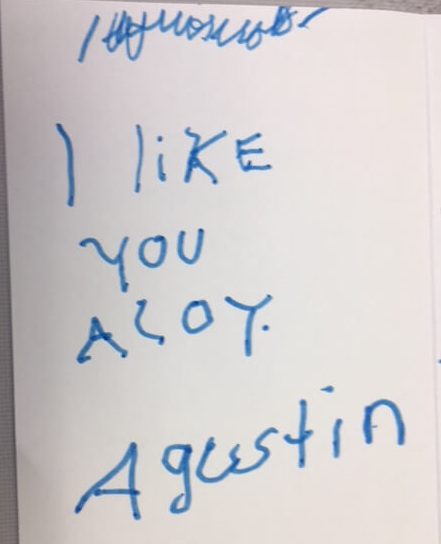
A collaborative ESL writing exercise
What inspired you to begin August Rivers Humanities?
My dad wound up in a nursing home and with dementia, and so in the interest of survival and time management, I decided that my creative practice, business and life would live there in the nursing home where I could make sure he was OK. I decided to document my life.
I noticed that dementia patients were experiencing the loss of their second language, which in this context is English. Memory care, communication and ESL issues were some areas that were really affecting outcomes for families and patients. I wanted to certify with Bridge and so we actually designed the curriculum as my IDELT project.
Can you tell us more about your educational philosophy that language is therapy?
Everything in life is language
I always felt it but was able to articulate it during my IDELT studies with Terry. I was reading about the work of Beth Olshansky and visiting the patients at the nursing home. Olshansky developed a literacy curriculum that was delivered through art. I remember something clicking when I read about how she has her students paint stories and read pictures. I had grown up around my dad’s ancient traditions of narrative musical storytelling and my grandmother’s abstract expressionist artwork and taken a lot of creative writing courses. I’d always felt the poetry of the Spanish language and the relationship between Garcia Lorca and Flamenco. The idea that when a person was painting they were reciting a story and that when a person was viewing art they were reading one really stuck with me.
I remember one day I visited a woman who was in a very advanced state. I brought my dog. We didn’t speak much but there was a different form of communication. She was speaking Farsi. I communicated calm, a lack of expectations and safety. It turned out that she loves dogs and her eyes lit up. She became very happy, and her daughter was shocked and told me I had a gift. I began to see everything in life as a language. This time it was comfort.
Teresa’s dad teaches Spanish as part of language therapy:
Helping others communicate
I heard about another woman who lost her relationship with her mom because she never learned how to speak her mother’s first language, French, and her mom forgot how to speak English.
I watched the SLPs (speech-language pathologists) run ragged with their clipboards and their insurance requirements, and it seemed these patients were held to an expectation where they were supposed to come and meet our standards. It felt wrong to me to measure in this way. I spent a lot of time reflecting on the origin and nature of language itself. I realized that it shouldn’t be an enormous gift to stop and take the time to humanize and communicate with a person. I decided with my whole heart that I should grade my own paper on how well I let dementia patients know that I believe one million percent that they are vital and alive inside and how well I accommodate that place for them.
Language as a form of therapy
I developed my philosophy with an interview and an equation.
My interviewee was an art therapy patient at Sutter Hospital and is also Chinese. We established that the Chinese character for a person is both language and art. It is painted or drawn as a stick figure missing one limb. So we drew it both ways, once as a language character (missing limb) and once as art (with limb).
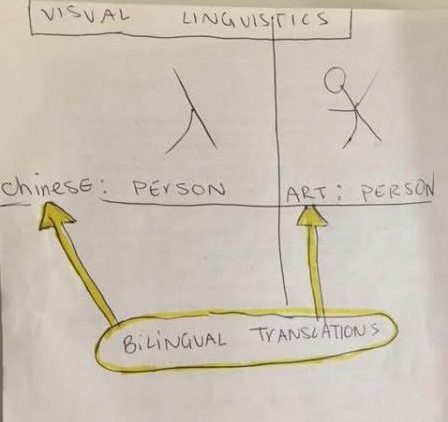
Art to Chinese diagram
We had already established that art was therapy and so we plugged in our equation and went to work:
art = therapy
art = language
therefore, therapy = language
I delivered the art therapy concepts via ESL within a memory care curriculum. It gives some life to terms that can be dull in textbooks, like “progressive” or “communicative” or “humanistic approach.” I come prepared for the purpose of allowing spontaneity, autonomy and a shared teaching and learning experience.
What’s a typical workday like for you and your tutors?
My days are pretty atypical. I juggle checking in with August Rivers, where I am taking clients over Zoom, creating new course content for my upcoming courses on Teachable and Canvas and managing my galleries of artwork and photographs. I manage my dad’s care as well, and my own self-care so I am able to take advantage of my most able-bodied moments and get a lot done while resting through rough patches. I love that my job is to offer this to others.
Has the coronavirus affected your work, and if so, in what ways?
The coronavirus has had a huge impact on me. I’ve been quarantined since March 8. I pulled my dad out of the nursing home just before it locked down, so it has been a huge adjustment. He requires 24-hour care, so I’ve been a busy bee. I’ve been teaching my helpers English and working from home. It’s really underpinned for me the value of online education and reminded me of the days when I was too ill to go anywhere but online.
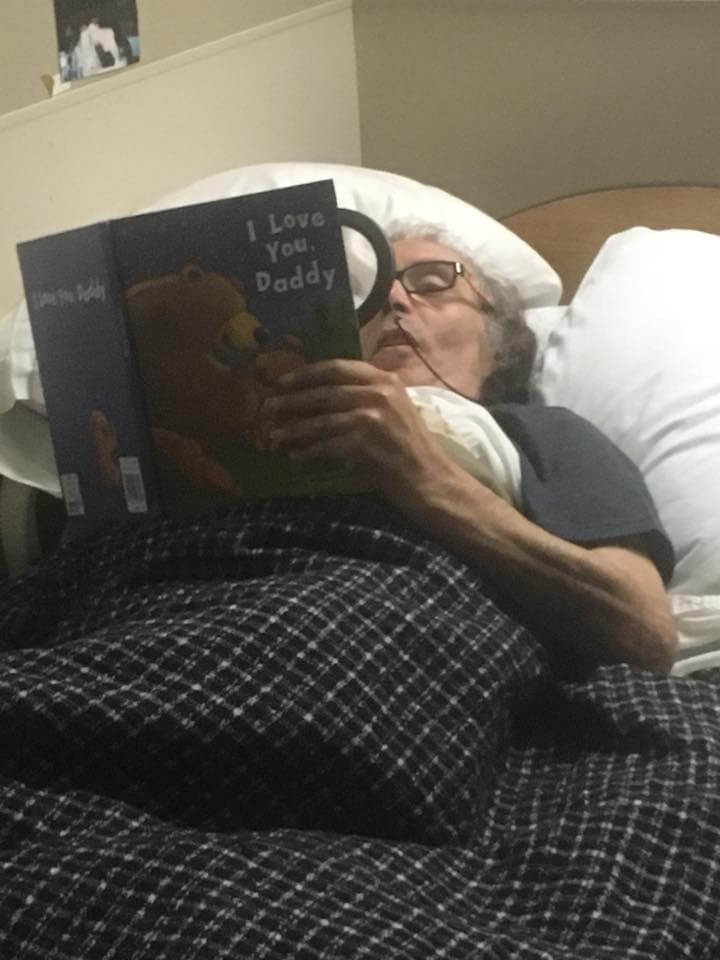
Integrated reading and emotional care exercise
What advice can you offer to other teachers who want to start an online tutoring business? How can they get started and how can they market themselves?
Define and articulate who you are. Choose an original name that has a good ring to it and is easy to remember and write down. Google it first and see what comes up. A slow burn is better than going in a million directions. You want solid contacts, not every contact, so build your network thoughtfully. If someone tells you that you can’t do something, go right out and do it.
What do you love most about teaching?
The two things I love most about teaching are learning and what every teacher loves: that sparkle a student gets in their eye when they figure something out.

